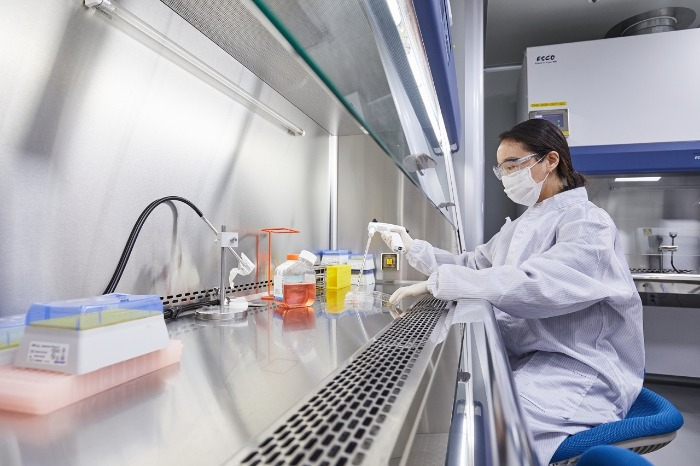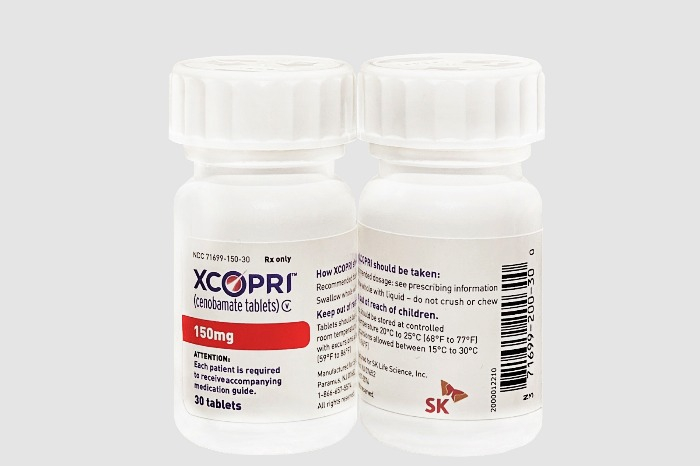Bio & Pharma
Novel medicines poised to be Korea’s next mainstay export
The country's new medicine exports have seen a rapid and steady rise since its first original medicine licensing-out deal in 2010
By Feb 27, 2023 (Gmt+09:00)
3
Min read
Most Read
LG Chem to sell water filter business to Glenwood PE for $692 million


Kyobo Life poised to buy Japan’s SBI Group-owned savings bank


KT&G eyes overseas M&A after rejecting activist fund's offer


StockX in merger talks with Naver’s online reseller Kream


Mirae Asset to be named Korea Post’s core real estate fund operator



South Korea, a major global generic and biosimilar medicine producer with leading names such as Samsung Biologics Co. and Celltrion Inc., has rapidly ascended to the ranks of the global pharmaceutical powerhouses – in just one decade or so since the country exported its new medicine for the first time in 2010.
Daewoong Pharmaceutical Co. last week announced that it signed a 110 billion won ($83 million) contract with M8 Pharmaceuticals Inc., a medicine licensing and distribution biopharmaceutical company in Latin America, to launch its new diabetes treatment Envlo (enavogliflozin) in Brazil and Mexico.
This marked Korea’s first export of a drug before its local launch. The South American partner has agreed to market Envlo for 10 years in the region and aims to receive marketing approval for the Korean drug this year for its launch in the second half of next year.
Daewoong Pharmaceutical’s success comes after other major license-out deals by Korean pharmaceutical companies in recent years, especially in chronic disease treatment.
HK inno.N Corp.’s gastroesophageal reflux disease treatment (GERD) K-CAB (tegoprazan) is currently prescribed in 35 countries since it was first approved in 2018. It has emerged as a strong rival to Japanese pharmaceutical company Takeda’s TAKECAB, which is also challenged by another Korean GERD treatment, Daewoong Pharmaceutical-developed Fexuclue, approved in 2021 and currently available in 15 foreign countries.
HK inno.N’s Chinese partner Luoxin Pharmaceutical Group, which signed a $95 million deal to market K-CAB in China in 2015, aims to bump up K-CAB’s sales in China to 1 billion yuan ($143.2 million) this year.
An increasing number of Korean pharmaceutical companies are joining their bigger global rivals in the race to develop new drugs after years of focusing on copycat and biosimilar medicines.
As a latecomer in the global novel medicine development market, Korea registered its first locally developed drug in 1999 with SK Chemicals Co.’s Sunpla, a gastric cancer treatment.
Il Yang Pharmaceutical Co. paved the way for the export of Korea-developed novel drugs with its anti-ulcer treatment Noltec tab (Ilaprazole) in around 2010, followed by Boryung Corp.’s (former Boryung Pharmaceutical) hypertension medicine, Kanarb.
KOREA, AN EMERGING PHARMA POWERHOUSE
Just about a decade after the country’s first new medicine licensing-out deal, Korea’s original medicines are rapidly expanding their presence in the global market, including the US, home to some of the world’s biggest pharma companies.

US sales of SK Biopharmaceutical Co.’s XCOPRI (cenobamate tablets), an anti-epileptic treatment, are forecast to reach $200 million in 2023 after selling 169.2 billion won ($128.2 million) the previous year.
Its US sales are expected to surge to 1 trillion won ($756.3 million) in four to five years. Its sales have rapidly increased by about 60% every year since its launch in 2020, according to the pharmaceutical industry.
US sales of Hanmi Pharmaceutical Co.’s Rolvedon (eflapegrastim-xnst), a drug used to reduce the incidence of infection as manifested by febrile neutropenia in adult patients with non-myeloid malignancies, topped $10 million just three months after its launch in the US by Spectrum Pharmaceuticals Inc.
The Janssen Pharmaceutical Companies of Johnson & Johnson also plans to market Yuhan Corp.’s Leclaza (Lazertinib) in the US. The Korean company signed a 1.4 trillion won deal to license out the non-small cell lung cancer (NSCLC) cure with its US partner in 2018.
The medicine is set to become Korea’s first novel drug to reach a 1 trillion won sales milestone by 2027 if it is launched as a lung cancer treatment in the US and Europe.
Write to Ji-Hyun Lee at bluesky@hankyung.com
Sookyung Seo edited this article.
More to Read
-
 Bio & PharmaKorea's Daewoong to export diabetes drug Envlo to Brazil, Mexico
Bio & PharmaKorea's Daewoong to export diabetes drug Envlo to Brazil, MexicoFeb 24, 2023 (Gmt+09:00)
1 Min read -
 Bio & PharmaHK inno.N's GERD drug K-CAB gets approval in Mexico
Bio & PharmaHK inno.N's GERD drug K-CAB gets approval in MexicoFeb 14, 2023 (Gmt+09:00)
1 Min read -
 Bio & PharmaHK inno.N's K-CAB to get insurance benefits in China
Bio & PharmaHK inno.N's K-CAB to get insurance benefits in ChinaJan 20, 2023 (Gmt+09:00)
1 Min read -

-
 Bio & PharmaFDA to review Hanmi Pharmaceutical’s Rolontis for marketing approval
Bio & PharmaFDA to review Hanmi Pharmaceutical’s Rolontis for marketing approvalApr 13, 2022 (Gmt+09:00)
1 Min read
Comment 0
LOG IN


